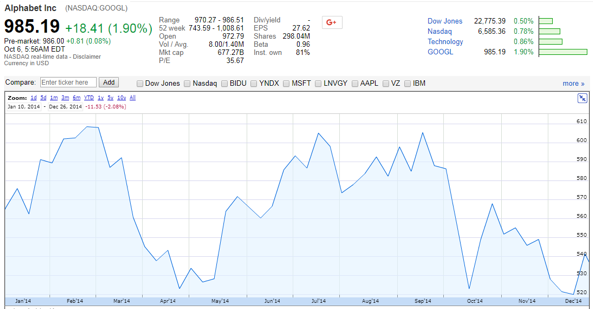The investor’s common image is a sweaty trader sitting in front of five monitors loaded with information and graphs with strange markings, while the telephones behind him ring constantly. Although there are several people who do this (without the sweating as the air condition is usually turned on…), successful investing in the stock market requires a totally different approach. Your success does not depend on the fact that you have the most up-to-date information from the last second and not whether you have the fastest computer in the world. On the contrary, what you need is a long-term perspective and non-frequent trading actions in your portfolio.
Why day-trading and Technical Analysis doesn’t work?
The figure below shows the behavior of Google’s stock (GOOG) during 2014. Do you really think you can predict the stock behavior in such a short period?

Probably not, but there are people who think they can. They are called Short-Term Traders or Day Traders.
Beyond the effort and time spent by stock traders, and even without discussing the question of whether it is possible to succeed in short-term stock trading in which we will deal with in the next chapter, they will have to achieve a very high returns in order to compensate for the various factors that will reduce their profits. First, the number of buying and selling orders they perform involves high cumulative fees. There are also hidden trading costs that many traders fail to pay attention to, such as the cost of the margin between the price of the offer and the price offered by the buyers. These hidden costs will be a fraction of the share price, but they could accumulate to large amounts if too many trades are carried out.
Many traders also overlook the fact that any sale of a security in profit involves a high tax charge on the capital gain generated (the tax is different in each country). Of course, this tax payment cannot be canceled, but too frequent trading will lead to a much larger tax payment and ultimately reduce our profits. In a long-term investment, however, it is quite possible to reduce these expenses.
What is an investment and why it is the smartest way for you
Investing in stocks also involves spending time searching for attractive companies for your stock portfolio, but it is completely different from trading. An investor purchases his holdings in order to hold them for a longer period. He does not try to time the exact entry point into a particular position, and concentrates on buying his shares at a valuation low enough, leading him to achieve a positive return after the stock rises to its true price. Therefore, the investor is not required to devote long hours to exhausting staring at many computer screens try tracking the unexpected volatility in the prices of his shares. He also does not have to be attentive to the economic news every few minutes in order to check whether there is any change in market behavior.
The long-term concentration of the investor also helps him to significantly reduce the disadvantages of buying and selling activities, thus paying much lower commissions, reducing the tax effect on the portfolio, and overall achieving a higher return.
Investing is like chess, where thought, patience and focus on the more distant future are what led to the success. This is the way the most successful investors in the world are using and this is the path that will also lead you to success. Remember, doing the right investment steps is much more important than the speed with which you do them.
Read on to the next chapter: